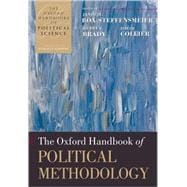
Note: Supplemental materials are not guaranteed with Rental or Used book purchases.
Purchase Benefits
What is included with this book?
| Introduction | |
| Political Science Methodology as a Disciplinary Crossroads: An Overview of Diverse Influence | p. 1 |
| Building Blocks of Social Science Methodology | p. 1 |
| Intentionality, Rationality and Individual Action: Alternative Views | |
| Interpretive Perspectives: Meaning, Action and Intersubjectivity | |
| New Economic Perspectives: Beliefs, Signaling, Updating and Expectations | |
| Concepts and Measurement | |
| Theoretical Approaches to Concepts | p. 1 |
| The Evolving Influence of Psychometrics and Measurement Theory | p. 1 |
| Measurement in Qualitative Research and Exemplars of Concept Formation. and Measurement | p. 1 |
| General Lessons on Measurement | |
| Causality and Explanation in Social Research | |
| What is Causality? | |
| Statistical Framework for Inferring Causality | |
| Causal Inference in Quantitative and Qualitative Research | |
| Quantitative Tools for Causal Inference | |
| History of Quantitative Methodology | |
| Bayesian Analysis | |
| Time-Series Cross-Sectional Data Technique | |
| Spatial Analysis | |
| Hierarchical Modeling | |
| Discrete Choice Modeling18. Wendy K. Cho, Charles Manski: Ecological Inference | |
| Survey Methodology | |
| Survival Analysis | |
| Time Series Analysis | |
| Potentials and Limits of Political Methodology in Macrocomparative Research Designs | |
| Qualitative Tools for Causal Inference | |
| Case Studies, Process Tracing and Structured focused Comparison | |
| Comparative Historical Methods | |
| Fuzzy Set Analysis: Calibration versus Measurement | |
| Case-Orientated Configurational Research Using QCA | |
| Interviewing, Ethnography and Qualitative Field Methods | |
| Integrating Measurement and Causal Inference | |
| Methodology and Micro Foundations | |
| Studying Mechanisms: Strengthening Casual Inference in Quantitative Research | |
| Agent-Based Modeling | |
| Experiments, Quasi-Experiments and Natural Experiments | |
| Experimentation in Political Science | |
| Quasi-Experiments, Natural Experiments and Evaluation Research | |
| Organizations and Institutions in the Field of Methodology | |
| ICPSR, CQRM and APSA Political Methodology and Qualitative Methods Section | |
| Forty Years of Publishing in Political Methodology: Sage Publications, Specialized Journals, Newsletters and Access to Mainstream Journals | |
| Political Methodology: Old and New | |
| Making the Most of Complimentarily: Qualitative and Quantitative Methods | |
| Intersections in the Trajectories of Qualitative and Qualitative Methods | |
| Table of Contents provided by Publisher. All Rights Reserved. |
The New copy of this book will include any supplemental materials advertised. Please check the title of the book to determine if it should include any access cards, study guides, lab manuals, CDs, etc.
The Used, Rental and eBook copies of this book are not guaranteed to include any supplemental materials. Typically, only the book itself is included. This is true even if the title states it includes any access cards, study guides, lab manuals, CDs, etc.